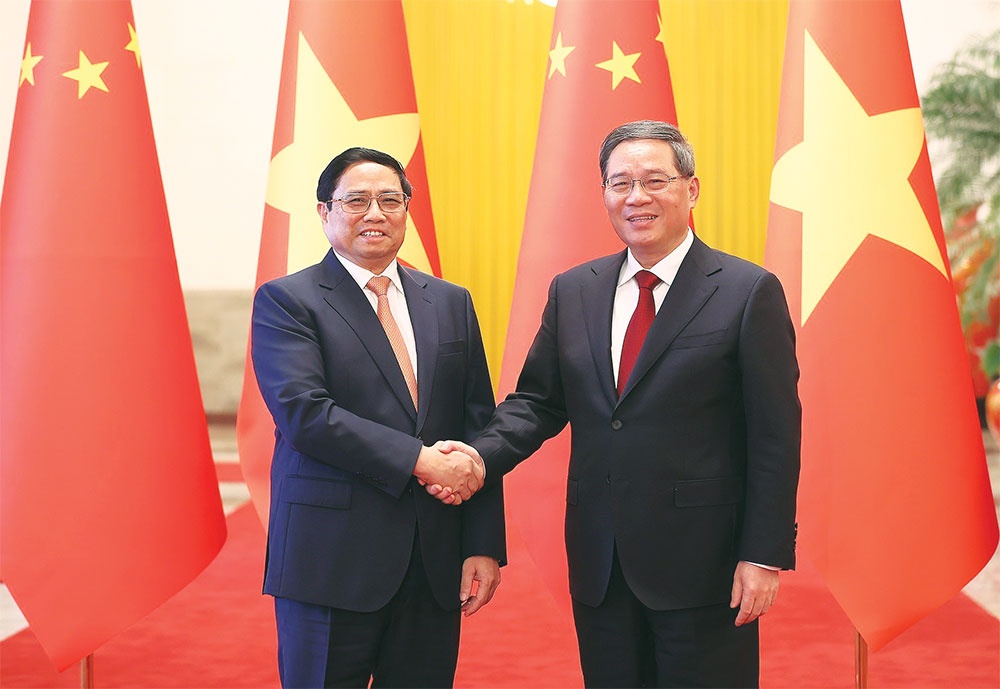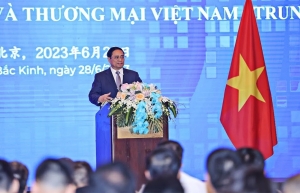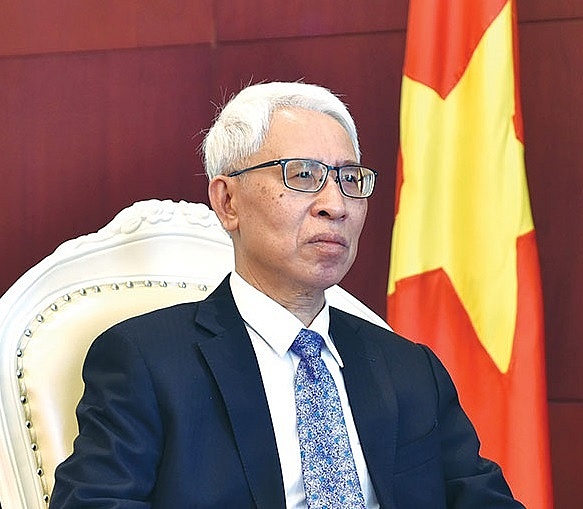Raft of plans boosted with Chinese ties
 |
| Vietnamese Prime Minister Pham Minh Chinh (left) met with Chinese Premier Li Qiang, photo VNA |
During bilateral talks in Beijing last week, Chinese Premier Li Qiang told Vietnamese Prime Minister Pham Minh Chinh that China would further open its market for Vietnamese goods, especially high-quality agricultural and aquatic products and fruits. China will also coordinate in creating better conditions for quarantine and customs clearance, and work with Vietnam to address institutional and policy challenges.
PM Qiang also suggested the two countries strengthen strategic connectivity, particularly in infrastructure and transport; promote cooperation in economy, trade; as well as boost cooperation in supply and production chains. The Chinese government encourages Chinese companies, especially large groups in high technology, to expand investment to Vietnam in line its demand and sustainable development strategy.
China will assign its agencies to deploy new solutions to expand its trade and investment ties with Vietnam. This will also benefit Vietnamese businesses wishing to expand their presence in the Chinese market.
For example, since 2016, Vietnam’s TH Group has been selling a wide range of products such to China, such as tea, juice, and milk
“TH Group wishes to find potential partners and customers, and continue to develop and promote TH Group’s products in the Chinese market, bringing products for public health and of international quality, and bringing the pride of the Vietnamese brand to the wider world,” said a representative of the group. “TH’s products have received special attention from consumers. They have been assessed by Chinese importers as having the same quality as those imported from European and American countries sold in this market.”
Nguyen Cong Bang, director of Cong Bang Farm Produce in Hanoi, said that his company had been exporting agricultural produce to China such as sweet potato, longan, mango, and watermelon. At present, Vietnam is allowed to export 13 types of agricultural produce to China.
“We are processing green beans and want to export them to China. It would be good news if China considers importing these products in the future,” Bang said.
At present, the top exports of China to Vietnam are integrated circuits, telephones, sound recordings, electric batteries, and other knitted or crocheted fabrics. Meanwhile, top imports of China from Vietnam include agricultural products, sound recordings, integrated circuits, broadcasting accessories, office machine parts, and non-retail pure cotton yarn.
At the bilateral talks, PM Chinh also proposed China accelerate the opening of its market to agricultural and aquatic products from Vietnam; as well as create conditions for the establishment of trade promotion offices of Vietnam in China’s Sichuan and Hainan provinces.
He also suggested that China coordinate to improve the customs clearance to avoid congestion at border gates; and work together to deal with problems of a number of cooperation projects.
The Vietnamese leader also recommended the two countries reinforce ties in finance, agriculture, transport, environment, and other areas, with a focus on digital transformation, green growth, circular economy, and climate change. Vietnam also recommended both nations enhance rail, road, and sea connectivity and resume commercial flights to expand trade and investment.
Last week in Beijing, PM Chinh also met with leaders of many major groups including Texhong International Group, Runergy, Energy China, Goertek, and TCL, among others.
Chairman of the Board of Texhong International Group, Hong Tianzhu, said it is exploring new opportunities in Vietnam’s textile and garment sector.
Texhong has invested over $1.6 billion in Vietnam since 2006, establishing 12 projects in Dong Nai, Quang Ninh, and Thai Binh provinces, creating employment opportunities for more than 25,000 workers. Additionally, in Quang Ninh, Texhong has established a textile industrial park to service a vertically integrated textile supply chain.
Last week also witnessed the signing and announcement of four cooperation documents between ministries, sectors, and localities of the two countries in immigration management, market supervision, smart border gate construction, and research on marine environmental management in the Gulf of Tonkin.
For instance, Vietnam’s Ministry of Industry and Trade (MoIT) signed an MoU on cooperation with the State Administration for Market Regulation of China. It is expected to set up a comprehensive cooperation framework between the two sides in compliance with national laws and policies in their respective countries, and to form and develop collaboration in market management.
The two agencies will create better conditions for cooperation in the handling of violations of intellectual property rights enforcement, food safety, and consumer rights protection.
According to the MoIT’s Asia-Africa Market Department, bilateral trade between Vietnam and China hit $175.6 billion last year, accounting for approximately 24 per cent of Vietnam’s total import-export turnover. In the first six months of this year, the figure reached $75.7 billion, with Vietnam’s exports to China hitting $25.6 billion, down 2.2 per cent on-year, and imports from China reaching $50.1 billion, down 18.7 per cent on-year. Vietnam’s exports to and imports from China account for 15 and 32.8 per cent of its respective total worldwide.
According to the Vietnamese Ministry of Planning and Investment, as of June 20, Vietnam had more than 3,790 Chinese valid ventures registered at $25.18 billion, making China its sixth-largest foreign investor.
| Pham Sao Mai-Vietnamese Ambassador to China
China is the largest trade partner, the biggest importing market, and the second-largest export market of Vietnam. Vietnam is the largest trade partner in ASEAN of China. The import-export structures of the two countries are constantly supplementing each other, and jointly linked with regional and global production and supply chains. According to the General Department of Vietnam Customs, in the first five months of 2023, two-way trade turnover reached $63.2 billion, down 12.3 per cent on-year. However, Vietnam’s agricultural exports to China increased sharply, of which rice exports climbed 62.8 per cent, cashew nut exports expanded 8 per cent, and durian exports ascended by 18 times over the same period last year. China is now focused on maintaining stable development and ensuring growth. Therefore, Vietnam has many good conditions to promote exports of goods to China when the import-export corridor becomes more open, and the Chinese domestic market expands. Vietnam’s agricultural produce has several advantages due to China’s priority to ensure food security. Besides that, Vietnam’s exports to the Chinese market face challenges because consumption in China remains weak, and there is competitive pressure from goods imported from other countries into China and domestically produced products. The Vietnamese Embassy to China has frequently worked with agencies in China and coordinated with Vietnam’s domestic agencies to promote trade facilitation, open the Chinese market for Vietnamese products, and support businesses to remove difficulties at border gates and seaports. To increase Vietnamese exports to the Chinese market, a number of specific measures must be taken. Specifically, it is necessary to continue to maintain Vietnamese exports’ market share in Chinese localities bordering Vietnam such as Guangxi and Yunnan, while promoting exports to other potential regions around the country. Additionally, it is needed to take advantage of the market’s advantages, such as the convenient logistics system, e-commerce, sea and railway transport, and reduction of export pressure by road. Moreover, it is necessary to continue to improve the quality of Vietnamese goods exported to China, especially meeting the standards and requirements of this market for specific groups of goods, and increasing the quality and quantity of programmes providing information about the Chinese market. |
 | PM calls for more Chinese investments Prime Minister Pham Minh Chinh called on Chinese investors to expand investment in Vietnam, while addressing the Vietnam - China Trade and Investment Cooperation Forum in Beijing on June 28 within the framework of his official visit to China. |
 | Chinese conglomerates express strong interest in expanding investments in Vietnam Top Chinese groups, including Texhong Group, Goertek Group, and Energy China Group, have shown significant enthusiasm for expanding their investments across various sectors in Vietnam, signalling the country's growing appeal as a lucrative business destination. |
What the stars mean:
★ Poor ★ ★ Promising ★★★ Good ★★★★ Very good ★★★★★ Exceptional
Related Contents
Latest News
More News
- Hermes joins Long Thanh cargo terminal development (February 04, 2026 | 15:59)
- SCG enhances production and distribution in Vietnam (February 04, 2026 | 08:00)
- UNIVACCO strengthens Asia expansion with Vietnam facility (February 03, 2026 | 08:00)
- Cai Mep Ha Port project wins approval with $1.95bn investment (February 02, 2026 | 16:17)
- Repositioning Vietnam in Asia’s manufacturing race (February 02, 2026 | 16:00)
- Manufacturing growth remains solid in early 2026 (February 02, 2026 | 15:28)
- Navigating venture capital trends across the continent (February 02, 2026 | 14:00)
- Motivations to achieve high growth (February 02, 2026 | 11:00)
- Capacity and regulations among British areas of expertise in IFCs (February 02, 2026 | 09:09)
- Transition underway in German investment across Vietnam (February 02, 2026 | 08:00)


 Tag:
Tag:

















 Mobile Version
Mobile Version